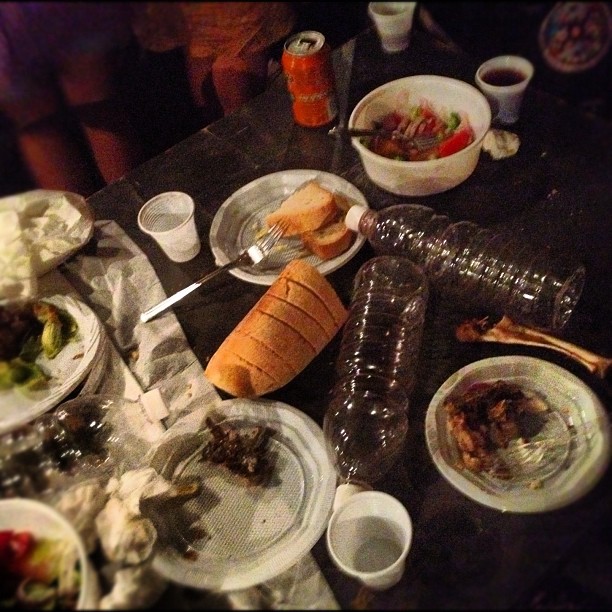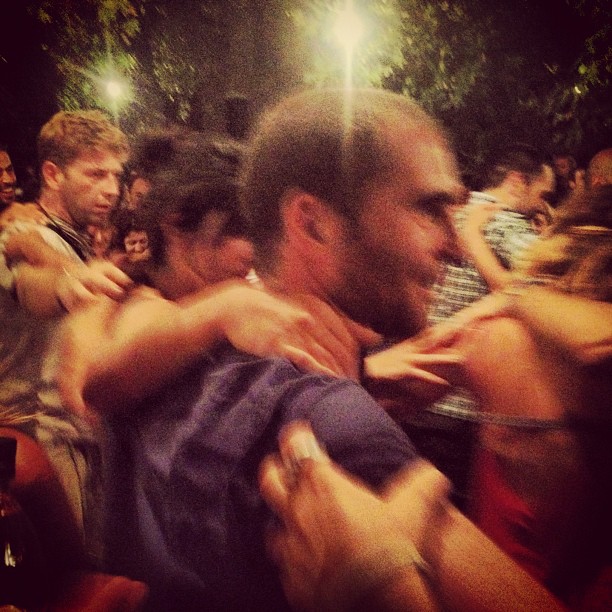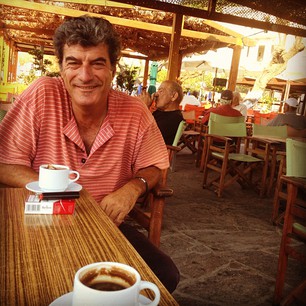I know I’ve shared a lot about Ikaria. But I really must tell you about these uniquely Ikarian village parties. They are like nothing I’ve ever witnessed. And the essence of what they’re about, I think, very much contributes to why the people here live so long and well.
Here’s a video of the dance floor at the Stavlos paniyiri…It’s midnight. The party started around lunchtime.
[youtube]http://www.youtube.com/watch?v=c2QNXaZdWWk[/youtube]
Every village in Ikaria has a paniyiri. From May to September there is one every few days on the island. Sometimes four in one day/night. They exist to bring people together. The houses on the island are spread out, due to the island’s problems with pirates and other attacks over the centuries (decentralised villages were harder to conquer), so paniyiri were for getting everyone close. They were also, I’m told, a way of distributing wealth within a village. The rich paid for the goats and wine.
When the paniyiri strikes, the entire village shuts down, trestle tables and chairs are set up in the village square, hundreds of goats are killed and roasted, the best of the local wine is collected from all the families in the village and siphoned into 1 litre water bottles, and at around 11pm all converge to… connect. You buy a slab of goat, salad, chips and cheese and you share this with family and friends. Around midnight the band starts. A violin,
guitar, bouzouki. They sing traditional Ikarian songs for – ooohhhh – around eight hours. Without stopping. The band reads the crowd…upping the tempo, taking things to more emotional depths, then whips things into a frenzy. It’s magical and spooky just how deeply intuitively they do it.
Everyone drinks wine. (One glass of wine, one glass of water, one swig of pork broth and a mouthful of goat meat. Repeat.) And dances. Everyone. Young and old.
But let me fill in the ephemeral gaps. I went to three paniyiri during my stay, but I really only committed to one (the others I “popped” in on, to see what they were about. I was too tired, confronted and shy to stay; also, I’m not a party/boozy/late night person). It was a “daytime” one that got into full swing around 9pm.
Driving up into the mountains on my motorbike, along the dusty track as the sun set, I could hear the wail of the music above the cicadas. In the forest it’s a little cooler and the air smells of pine and goats and mountain flowers and honey and of hot rocks sighing out the long day.
I wound up to the top of the hill and parked my bike among the hundreds (thousands?) scattered in the trees. I walked through the dark down the little streets. And came to the square.
A heaving mass of laughing, exhalting, mad humanity. Every trestle table is crammed with limbs and empty bottles and people are reaching for food and holding each other’s faces to kiss cheeks. Grandfathers are wrestling with two-year-olds. And within one minute of arriving, nervous and alone, I hear “Bravo Sarah”. Bravo, the guy from the travel agency I pass each day yells at me, you made it! His table of relatives grab me. They pour me wine. They give me a fork and tell me to eat. And, as always, they ask me what I think of the tomatoes, the goat, the wine. It’s all perfect. Simple and perfect.
Know this: an Ikarian will never let you pay for a drink or for food in their care. I caught a taxi to the port to leave Ikaria and the taxi driver insisted on buying me a coffee.
Know this: an Ikarian will never let you sit alone. Said taxi driver also insisted on keeping me company until my boat arrived.
And then you dance. I dance awkwardly, badly. But I’m pulled into the circle. You dance in a circle, arms around each other. It’s so sweaty, you give up on appearances.
There are several different dances, acrobatic and requiring fancy footwork, and you dip and weave and the song goes for ten minutes. Or as long as the band feels the crowd needs.
Know this, too: the Icarians are known for being freakishly intuitive. Spookily so.
The dancefloor is packed. I mean really packed. We pack in tighter, to fit more people in. We are sweating all together. And everyone looks up, not at their feet. We smile at each other. And it’s more a smile then a laugh.
And then this is what happens. Something happens. Something shifts. I shut my eyes and I’m suddenly taken with how soulful the music is. It rips at my guts and it carries my worries away. Greek folk music has a minor key-melancholy to it. And I’m dancing without trying. And I can feel everyone smiling and loving being there. Really loving it.
And this happiness I’m feeling doesn’t have a heart-sinky aftertaste, one that reminds me it won’t last, as many happy things do.
The feeling is just perfectly enough.
Yes, seen from above, the scene is wild. But it’s also serene. And the reason is this: these parties are not about going inwards. They are about expressing and giving outwards. It’s an idea I discussed one night at Thea’s with Nicola, a Greek academic who studies the role of collective experiences and has investigated the history of panyeiri.
For this night you forget your little ego and it’s a shared human experience.
It’s all heart and “flow” for a night. And do you know what a bloody relief that is for the head?!
I know this sounds cheesy…but it’s a spiritual experience.
You emerge at dawn sleepy but invigorated. Like after a night of sex with a new lover.
I’ve gone on a bit. But to the longevity lesson. These things aren’t particularly healthy – apart from the sweating and exercise. But they’re about letting go. REALLY letting go.
It’s about connecting with the heart, uncynically. All the cool teens and handsome men and gorgeous women (know this, too: the Ikarians are very good looking) embrace the relative dagginess of it and are proud of the tradition.
It’s also about connecting with all generations. The old people are included fully.
Dan Buettner has found in The Blue Zones that one of the nine principles of longevity is to ritualize. At least one period of the week where you de-stress, spend time with friends and family, and do community building. You all have lunch together on a Saturday – stop everything; cut the stress out; go to luncheons with family…including the older people.
A paniyiri, then, is a ritual all about getting down and close and connected with what matters.
Finally, just a quick word about wine.
Ask the people here the key to longevity and they will tell you it’s the wine. As an aside, Dionysos, the God of wine, is said to come from Ikaria. They drink a lot of it. But, a closer look reveals:
· it’s mostly drunk diluted with water (I got a real taste for doing this)
· it’s organic and grown locally
· it’s only ever drunk with food and never alone. You always – but also only – drink wine with loved ones. A loved one arrives, no matter the time of day, and out comes the wine a block of cheese and some tomatoes. We witnessed this at 11am one morning.
· it’s drunk slowly. They stress this over and over. It takes time.
· And, finally, and intriguingly, the wine is seen as sacred. I couldn’t establish whether it was blessed for the panyeiri. But they spoke of it reverentially. And I feel that this is key, too.
They drink, just as they party, to connect spiritually with this very human flow and outward expression. Which I truly think, after almost a month of pondering it, is the key to wellness.
I hope you enjoyed this very long rant…




